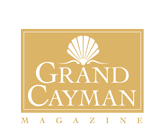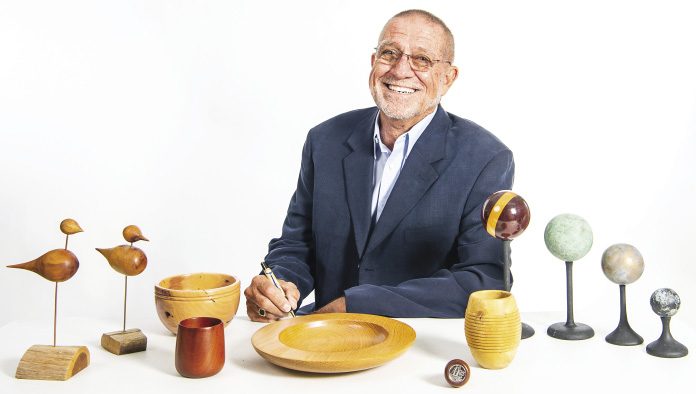Some people live where they were born, never leaving to explore the world, while others travel, but stick to one career from graduation to retirement.
Then, there is Lendell Layman.
Better known as Len in local society, Layman has lived a number of lives both in Cayman and the U.S. He has worked many different jobs, and for the last 13 years has parlayed his interest in woodturning into a serious hobby.
Early years
Layman was born in Massachusetts and grew up to be what he described as a “New England preppie.” His father was a very successful businessman and owned Loudon Advertising, one of the largest ad agencies in Boston.
He attended Holderness School in New Hampshire, a private prep institution straight out of scenes from “Dead Poets Society.” He admitted to having a privileged childhood, but wryly clarified that “I was born with a silver spoon in my mouth but adjusted very well to plastic.”
Layman first discovered he had a creative streak when he was a child in summer camp. “We took a time lapse picture of Sputnik I when it was first put into orbit,” he said, “and from that moment, I was hooked on photography.”
He started off with a simple Brownie box camera, but quickly graduated to his first “real camera” – a Minolta – which he bought with money earned working as a golf caddie one summer. It wasn’t long before his photography skills got him noticed in school, and he became the photo editor of the yearbook as well as the president of the photography club.
No one in his family was artistic or creative, but it was clear that Layman marched to the beat of his own drummer.
University and the Air Force
After spending all of his childhood up north, Layman made a geographical shift south – to Georgia, to be precise. He was to attend Georgia Tech University and get a degree but got sidelined by a stint with the Air Force partway through. It was the time of the Vietnam War and the draft was active. Layman decided to sign up before it was done for him, and he ended up working as an accountant in the Force for four years.
 He started at Georgia Tech but eventually graduated from Georgia State with a degree in sales and marketing. Layman was let loose on an unsuspecting corporate world, entering the food industry.
He started at Georgia Tech but eventually graduated from Georgia State with a degree in sales and marketing. Layman was let loose on an unsuspecting corporate world, entering the food industry.
His job made him immensely popular, thanks to his employer, Peter Paul Cadbury. Peter Paul was known for the Almond Joy and Mounds chocolate bars (sometimes you feel like a nut …) and Cadbury was, well, Cadbury! Cadbury acquired Peter Paul in 1978, creating a glorious marriage of chocolate products from both sides of the pond.
“I had the best sample cabinet in the building,” said Layman, wistfully.
When he left Peter Paul Cadbury, he moved on to other tasty treats, taking a job with the Mauna Loa company, famous for its macadamia nuts. Despite sampling hundreds over time, Layman states he is still a fan.
Cayman bound
The lure of scuba diving in pristine waters first pulled Layman to Cayman’s bosom in 1982. That first trip was followed by a second and a third, and before he knew it, he was taking two 10-day vacations a year to the islands. By 1991, he was ready to exchange macadamia nuts for coconuts. Divi Tiara in Cayman Brac had a hole the size of a boat captain/dive instructor and Layman was able to fill it.
He stayed in the Brac for about 5 years, enjoying his “Peter Pan moment.” At that time, there were many white-collar workers such as dentists and accountants doing the same; getting away from it all to live the dream in a Caribbean island. No shirt, no tie, no problem.
In 1996 he made the leap to the big island: Grand Cayman. He worked for Rivers Sport Divers for nearly 2 years, before his love of photography suddenly reared its head again.
“Mike Nelson pioneered the industry of taking pictures on boat tours and selling the images to tourists,” said Layman. “He approached me and asked if I’d be interested in partnering with him.”
“We were the first to use digital cameras at Stingray City; we even had to build our own waterproof housings, they just weren’t available on the market.
“We’d take the pictures, then it would be a race to print the images on the boat and sell them as we headed back to shore,” he said.
For a while, it was almost a license to print money, but technology inevitably caught up about 4 years later, making it easy for others to get in the game.
Layman took his sales and marketing skills to another industry: real estate. He started with Century 21 and then moved on to Regal Realty, where he still works to this day.
Turning to woodturning
Layman is almost as well known for his wood crafts as he is his work in the community and real estate, which is surprising, considering the fact that he only learned the skill 13 years ago.
“A friend of mine was doing woodworking as a hobby,” he said, “and one day I heard a song that had really neat flute music in it. It was being played on a Native American-style flute.
“I came across a website with instructions on how to make one, and my friend let me use his shop, despite the fact that I had no prior experience.”
Layman enjoyed the process so much, that he made a few of the flutes, learning as he went along.
“At that stage, I thought, ‘Maybe if I had a lathe, it would be easier to make the flutes and make them better,’ so I ordered and shipped in a lathe.
“Turned out I didn’t like the way it made flutes – they were better when made by hand … but I liked the way it made bowls and other stuff,” he laughed.
 By this point it was becoming more than just a casual hobby for him. He soaked up any information he could find on the Internet and began attending the American Association of Woodturners Symposium each year. The largest gathering of woodturners in the world, the symposium offers a wealth of knowledge on the subject with experts giving demonstrations and attendees sharing their own personal tips with each other.
By this point it was becoming more than just a casual hobby for him. He soaked up any information he could find on the Internet and began attending the American Association of Woodturners Symposium each year. The largest gathering of woodturners in the world, the symposium offers a wealth of knowledge on the subject with experts giving demonstrations and attendees sharing their own personal tips with each other.
He had the tools, he had the knowledge and with growing confidence, Layman began to experiment with different types of wood and shapes. “I started making bowls, pens … anything I could think of,” he said.
He gave some of his items as gifts and, inevitably, requests started coming in to buy his creations. He would subsequently pop up from time to time at the local markets, but there was no urgency in his method.
“I don’t do woodturning to make money,” he said. “I usually just sell stuff so I can buy some more tools. It’s cheaper than therapy!”
A therapeutic experience is exactly what Layman wants it to be. “If there is pressure for me to build my inventory, then suddenly it’s not a hobby anymore and it adds stress instead of relieving me of it,” he explained.
Layman’s biggest frustration is sourcing materials. In the U.S., lumber is easily accessible, but in Cayman, it is much harder to come by.
“Obviously I’m not going to go around cutting down trees,” he said, “so I have a few contacts that let me know if a piece of land is going to be cleared or a tree is going to be removed so I can get the wood. But, many times, I’ll see that a lot has suddenly been razed and all that fantastic wood has been taken to the dump; it could be used, and it just gets thrown away.”
Local mahogany is arguably his favorite to work with, when he can get it, and he has also made decorative items out of seagrape wood, although those trees don’t really get so big that he can do a lot with them.
“I’ve also used snake wood and whatever other local woods I can get my hands on,” he said. The one tree that has him completely stumped (ahem) is the palm tree. “I can’t do anything with palm trees,” he admitted.
Once in a while, Layman goes bigger and ventures into the world of furniture. In fact, he built his own nightstand and bed frame. But, for the most part, he sticks with the smaller items, mainly due to time and scarce materials.
At one point he was getting into a rut when it came to designs, so a friend suggested he take a drawing course. Not only did it spark his imagination, he also found he was far more artistic than he realized. Perhaps he will be venturing into the painters’ market in the near future.
Making a memory
Over the years, Layman has taken the odd commission, usually making a piece that has some historical or sentimental value to his client.
“I’ve been asked to make something from a beloved tree that is cut down by someone’s house,” he said. “I like that kind of commission – when you are creating something with a story behind it.”
His bottle stoppers made of wood with a Cayman Islands 25 cents piece at the top are very popular with locals and visitors, probably for the same reason.
Now that Layman has his own shop at his house (he laughed and said that his friend who got him interested in woodturning was very happy to see him go), he has passed on his knowledge to a few others.
There was a young man who wanted him to make a pen for him, and rather than doing so, Layman said he would show him how to make his own.
“I’ve done a bit of teaching,” he said, “and I’d love to do some more.”
Community service
Beyond the myriad hats that Layman has worn through his time in the U.S. and Cayman, he has also been an advocate for the most vulnerable in society. He is a founding member of the Cayman Islands Crisis Centre and was the chairman of that organization’s board for 13 years. He was a member of Rotary in Cayman Brac followed by Grand Cayman, and is an active member of the Cayman Islands Angling Club.
He was awarded the Cayman Islands Certificate and Badge of Honour in 2011 for services to the Cayman Islands Community.
It can certainly be said that Layman has lived life to the fullest, and looking at that twinkle in his eye, there is still plenty of gumption left in the old boy yet.
“Dead Poets Society” reminded us that we should “seize the day” and “suck out all the marrow of life.” Len Layman is doing just that.























